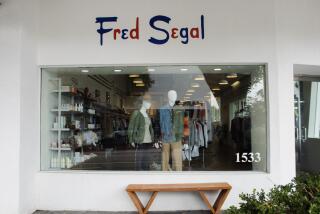Closing a Legendary Competitor Is a Thankless Task
- Share via
The once proud New York City fashion maven had the look of a ravaged mannequin. Her clothing racks were largely stripped and her glitzy costume jewelry was going for a dollar a throw. Still, the bargain hunters were there for the final day of a going-out-of-business sale at the legendary Gimbels department store in Herald Square. “I’m glad the store is closing because I can’t afford all the bargains,” said Tim Klein, a 29-year-old actor who was able to furnish his apartment despite limited finances. Among the bargains: an $800, six-foot upholstered couch bought for a paltry $43, and five matching wingback chairs, originally $1,000, for $50. After 76 years, the company’s Miracle-on-34th-Street competitor with Macy’s was closing due to dwindling sales. That was fine with Dolores Fox, who rummaged in a bin full of slightly bedraggled wigs and found a long brunette one, reduced to $4. “I’ve bought some fantastic things here,” she said. “I’m sorry this is the last day.” But as customers scooped up the few remaining items in the store, saleswoman Kate Kirchein, 67, shook her head in disgust. “Nobody’s said goodby to us or thank you,” she said. “It’s the coldest thing. And I’ve worked here for 28 years.”
--A Pennsylvania man who was trying to become the first paraplegic to swim the English Channel ended his attempt after 2 hours, 19 minutes, and was hospitalized with mild hypothermia. Jim McGowan, 54, who is paralyzed from the mid-chest down, swam using the backstroke for 2 1/2 miles before signaling to an escort boat that he wanted to leave the 57-degree water. His coach and trainer, Lou Neishloss, said McGowan would remain in Buckland Hospital in Dover, England, for 24 hours, but “he’s going to be fine.” A graduate student in counseling psychology at Temple University in Philadelphia, McGowan was partially paralyzed in 1951 after being stabbed in the abdomen by members of a New York City street gang.
--The Italian newspapers had been filled for days with accounts of his Genoese ancestry (on his mother’s side). So when Frank Sinatra strolled onto the stage at Milan’s 9,000-seat Palatrussardi sports hall, he was greeted with a fervor one would expect only for a returning son. Tens of millions more spent the evening glued to their televisions and radios for a live broadcast of the concert, Sinatra’s first in Italy since 1962. Prime Minister Bettino Craxi, several government ministers, top industrialists and the big names of Italian show business filled the front seats at the concert.






